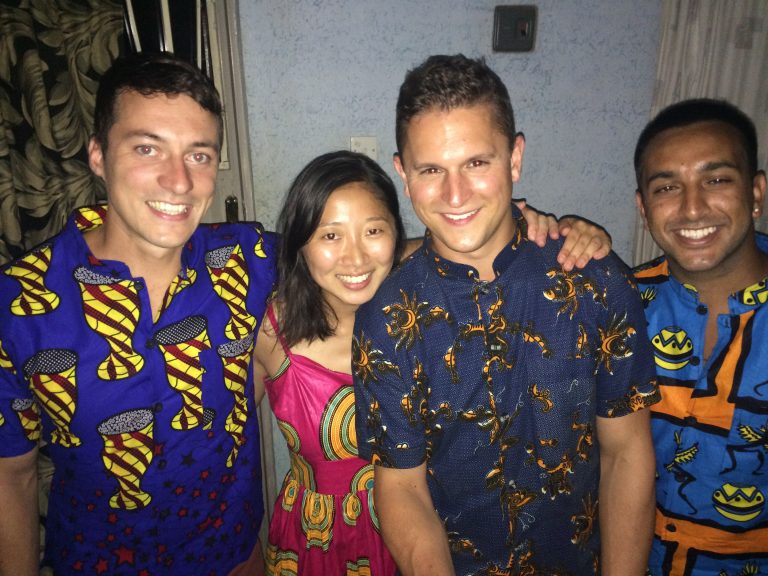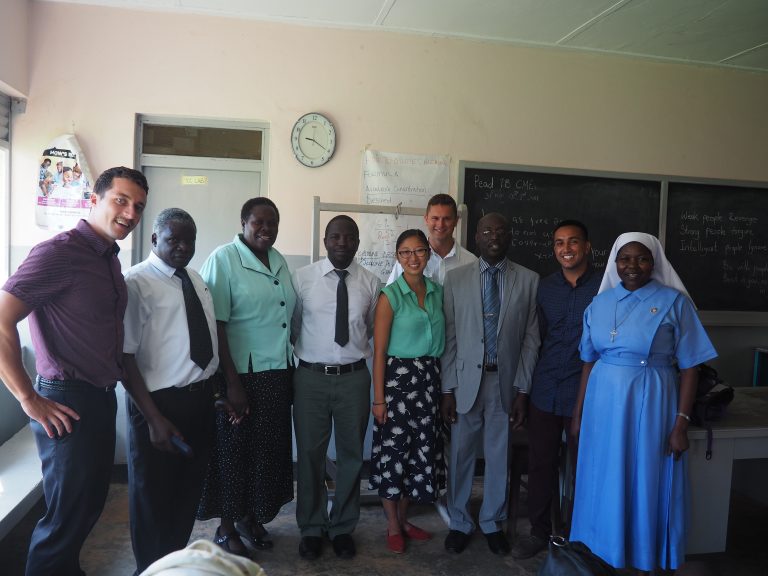Written by Laura Kim, MD 2019
Even though we had just gotten a tour of the Soroti Regional Referral Hospital, the four of us stood on one of the hospital’s many walkways, each pointing in different directions: we were only a two-minute walk from our guesthouse, but none of us knew which direction that walk was. We scratched our heads, tried to orient ourselves, but continued to stand there, clueless. As the locals walked past us, they giggled at our confusion. I guess that’s why the Swahili word for white-skinned foreigner, mzungu, literally translates to “someone who wanders around.”
Day-by-day, we wandered a bit less, and walked with a bit more purpose. We eventually fell into a semi-routine. We would wake up in the morning, eat our chapatti (Indian-style flour pancake), G-Nut sauce (Ugandan peanut butter) and instant coffee (if we were lucky), and tote our purple backpacks to Morning Assembly. The Morning Assembly, set every day at 8am, was a meeting where every hospital worker sat down to discuss the goings on in the hospital, case reports from each of the wards, and ways to improve patient care. Our team liked to be punctual, but we realized that most of the healthcare workers at Soroti Hospital tended to run on African time; that is, everything slightly behind schedule. As we noticed that “on time” to Morning Assembly actually meant fifteen minutes late, our routine shifted later and later, until we started to wander in on African time, too.
After Morning Assembly, the four of us split off. The interns and doctors allowed us to tag along on whatever they were up to for the day, so we would follow them to wherever we were interested. We braved internal medicine, where we learned the value of checking patients’ conjunctivae to check for anemia, dehydration and jaundice, and spent a lot of time spiraling back to various weeks of MEDD 411 and 412. We hung out in the paediatric ward, where we made friends with a group of young boys with broken femurs: it was mango season, and they had fallen from the branches of trees in order to grab the last mangoes of the year. We donned scrubs in the Operating Theatre, where C-section after C-section was performed, to the point where they had to wait for the autoclave to catch up to the surgeons’ need for equipment. Every morning was slightly different, and we soaked in as much knowledge as we could from the talented physicians and interns.
Once we wrapped up our clinical experiences, we would meet up at the hospital canteen for a quick lunch (though ‘lunch’ often turned into inhaling a Clif bar and continuing the day), and start our research. Our afternoons of research were far more emotionally tolling than I expected. My project involved talking to parents in the paediatric ward, and asking them how they paid for their clinical care if the public system didn’t cover the cost. Our translator helped the parents to share their struggles: inability to pay for school fees, massive debts to families and neighbours, and the sale of their livestock and land in order to support their children in hospital. It was simultaneously heartbreaking and heartwarming to know the extent to which families were willing to go to nurse their children back to health. I learned an astonishing amount about the barriers that these families faced, and gained newfound appreciation for our Canadian system.
Evenings required some decompression time: we often sat in our bandas (Swahili for “hut”) or on the concrete pad of our guest home to reflect and chat about the day. We kept ourselves busy in the evenings by entering our data, trying out the local cuisine, and taking advantage of the slow-paced Ugandan lifestyle. One evening, our translator invited us to her home to teach us how to make chapatti and mendazis, two of our favourite Ugandan foods. We even tasted grasshopper and white ants (much to Rehman’s dismay)! The intern doctors also demonstrated their hospitality, showing us the best places in town to unwind after a long week.
By the end of the month, we felt at home in Soroti. We learned the ropes at the hospital, even getting a few questions right when we were percussed. The people in town recognized us, saying yoga (Ateso for “hello”) as we passed them on the streets. We even started to subconsciously adopt the accents of our Ugandan hosts, incorporating certain tones and words into our everyday speech. Although we were definitely still mzungus, at least we ended the trip wandering in the right direction.

